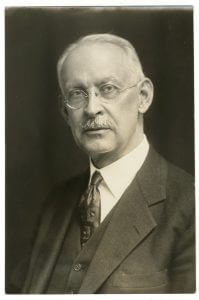MECS Bishop Who Supervised Mission in Congo, Brazil, and Mexico

The name James Cannon, Jr., usually conjures up vivid and often unflattering historical images. One thinks, for instance, of the militant crusader for prohibition during the Progressive era, the political preacher who campaigned against Al Smith in the presidential election of 1928, and the beleaguered cleric accused in the 1930s of stock-market gambling, financial wrongdoing, and adultery.
Such dramatic events, however, have obscured other aspects of Cannon’s career. Largely forgotten, for example, are his activities as a missionary bishop and champion of the ecumenical movement. A strong Wilsonian internationalist, he supervised southern Methodist missions in Mexico, the Congo, and Brazil, promoted world prohibition in Great Britain and on the continent, and participated in the international temperance and ecumenical conferences of that period. He also played an active role in humanitarian agencies, notably Near East Relief, the massive American philanthropy to aid the Christian victims of Turkish atrocities.
Although most prominent in the United States as a vigorous defender of prohibition in the 1920s, Cannon spent much of the decade abroad. Of his many trips overseas, one of the most memorable was his first visit to the Congo in 1922. The late Bishop Walter Russell Lambuth, the southern Methodist church’s foremost missionary leader, had founded the fledgling Congo Mission in 1914. As a church journalist and educator, Cannon had been a vigorous advocate of missions, and after Lambuth’s death, he reluctantly consented to make the difficult trip to central Africa. Cannon was burdened with other responsibilities, but no bishop had visited the Congo mission since its inception, and he considered such neglect to be unfair to the missionaries in the field, who needed episcopal attention and support.
An intense combatant and controversialist in the political and ecclesiastical arenas in America, Cannon was perhaps happiest when travelling overseas. The missionaries, dedicated to a life of Christian sacrifice and service abroad, admired his toughness, activism, and sense of duty. They also valued his internationalist perspective and vigorous advocacy of their cause. During the bitter struggle in the southern church over Methodist unification in 1925, Cannon strongly defended his church’s missionaries against charges of modernism and heresy.
At home, no one worked harder than Cannon for the Centenary, the southern church’s campaign in the 1920s to raise funds for missions. As a result, no one was more disappointed at the church’s failure to support that cause adequately. Despite setbacks, Cannon continued to believe that missions was the most important work of the church.
Adapted from Robert A. Hohner, “A Southern Methodist in Africa: Bishop James Cannon, Jr. and the Congo Mission,” Methodist History 31:1 (October 1992): 3-15.




